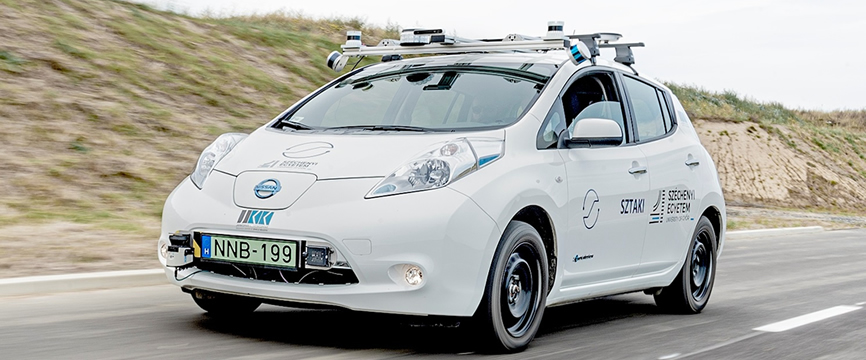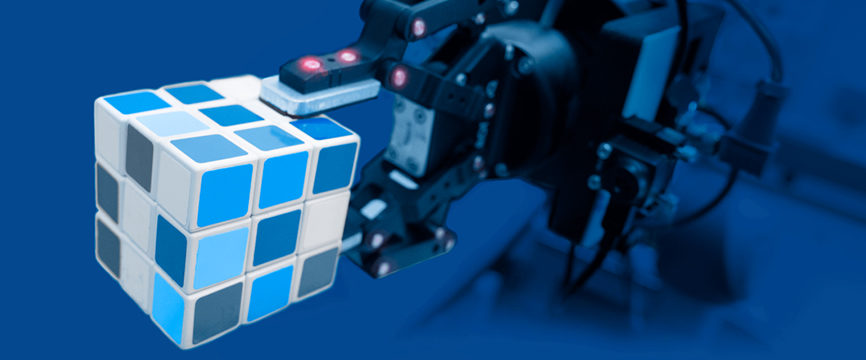News
Filter:
Fields of Operation

News
Many people think that technology is the biggest challenge in the development of self-driving cars. In fact, the most complex problem is the city itself: where people and cars, bicycles and scooters, buses and trams share the traffic, a single decision depends on dozens of factors. Researchers at HUN-REN SZTAKI’s Systems and Control Laboratory (SCL) are working on algorithms that can make quick and safe decisions even in the most complex situations.
06 08 2025

News
The car that sees into the future – How a domestically developed autonomous system saves fuel for us
While most drivers can see no further than the next bend, the autonomous system developed by the Systems and Control Laboratory (SCL) at HUN-REN SZTAKI calculates several kilometres ahead: it analyses the terrain, traffic patterns, and road conditions in real time, achieving an average fuel savings of 7 percent – up to ten times more efficient than human routine driving.
22 07 2025

News
The closing event of the successful REFORMula Challenge Innovation Competition was held in Mátraháza
The closing event of the REFORMula Challenge Innovation Competition for high school students, co-organized by ARNL, took place in Mátraháza, Hungary on 30-31 May 2025, with nearly 50 participants.
05 06 2025

News
The Autonomous Systems National Laboratory (ARNL) held its annual research and development demonstration day entitled "Innovation in Motion" at the ZalaZONE Industrial Park in Zalaegerszeg, Hungary on 26 May 2025. The event featured presentations of the latest developments by the HUN-REN Institute for Computer Science and Control, the Budapest University of Technology and Economics, and Széchenyi István University, all members of the ARNL consortium. The demonstration day highlighted that domestic research into autonomous systems is based on strong foundations, both from a scientific and practical perspective, and offers real answers to the transport and industrial challenges of the future.
28 05 2025

News
On Wednesday, April 30, 2025, the National Laboratory for Artificial Intelligence held a meetup at HUN-REN SZTAKI. The special professional evening focused on two- and four-legged robots and the latest developments in robotics.
06 05 2025

News
As part of the CEU Határtalan Tudás (Boundless Knowledge) series, three researchers from Artifical Intelligence National Laboratory (MILAB) gave presentations.
10 04 2025

News
With the collaboration of MILAB, Datarebit, and their partners, the Genesis Project was presented, along with its first result: Neural Nocturne, a fusion piece created through the synergy of artificial intelligence and composer-pianist Carlos Gallardo Riballo.
24 02 2025

News
The "2024 Call for Proposals of the Supported Research Groups Program" (TKCS-2024) by HUN-REN concluded successfully, attracting significant interest. Among the six winning proposals is the project submitted by Csaba Kerepesi, senior researcher at the Artificial Intelligence Research Laboratory’s BioAgeAI research group of HUN-REN SZTAKI.
11 12 2024

News
The MILAB coordinator institute welcomed visitors with more than ten programmes, including a robot dog demonstration, self-flying drones and the 50th anniversary of the microprocessor revolution.
21 11 2024

News
Between July 30 and August 1, 2024, the Hungarian Machine Learning Days was organized for the second time at the European Youth Centre in Budapest, by the Artificial Intelligence National Laboratory (MILAB), coordinated by HUN-REN SZTAKI.
05 08 2024

News
Young European experts in data-driven system modelling met on 23-24 May 2024 at HUN-REN SZTAKI to review and discuss the prevailing scientific trends in the field of system identification and machine learning.
02 07 2024

News
This year, for the second time, the international Student Scientific Competition (SSC) was organised. The competition followed the Hungarian model of the Scientific Student Conference (TDK), which has a history of success spanning over several decades. At SSC, students from the EELISA partner universities matched their knowledge with that of the other contestants, and presented the results of their research projects.
02 07 2024

News
Csanád Budai and Tamás Széles, developers of the Systems and Control Laboratory at HUN-REN SZTAKI, competed in Yokohama, Japan at the fifteenth F1TENTH Autonomous Grand Prix, held in the framework of the 2024 IEEE International Conference on Robotics and Automation (ICRA 2024) between 13 and 17 May 2024.
02 07 2024

News
The scientific cooperation project ‒ within the framework of the grant 2019-2.1.11-TÉT-2020-00125 ‒ concluded with open presentations given by researcher from the Sveučilište u Zagrebu (University of Zagreb) and HUN-REN SZTAKI. The programme included three lectures (in English): two lectures by the Croatian project partner, and one by the Hungarian project partner.
29 02 2024

News
At the event "The role of the EDIH network in economic development", HUN-REN SZTAKI, coordinator of MILAB, also represented itself with scientific demonstrations. The demonstrations were also visited by Szabolcs Szolnoki, Deputy State Secretary for Technology of the Ministry of Economic Development.
06 03 2024

News
Program:
- SMT production portfolio optimization using an evolutionary algorithm – Fischl Tamás (Bosch)
- EPIC Innolabs Kft (TBA)
- Modeling subjective sound perception using direct pair comparison – Farkas Máté (Bosch)
After the presentations, you are invited to visit Bosch Acoustic Laboratory and Vehicle Anechoic Chamber.
Attendance is free but strictly requires registration due to entry regulations. Please register here:
08 01 2024

News
02 11 2023

News
József Váncza, Head of the Research Laboratory for Engineering and Business Intelligence at HUN-REN SZTAKI, and leading researcher in autonomous robotics and manufacturing systems at ARNL, gave a plenary talk as an invited speaker at IMCC 2023, a major international scientific event.
13 12 2023




 ENG
ENG




